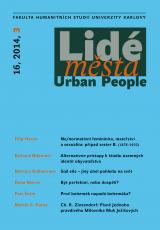Ne/normativní femininita, mateřství a sexualita
Případ sester B. (1878–1922)
DOI:
https://doi.org/10.14712/12128112.3427Klíčová slova:
body, history, representation, gender, nationalismAbstrakt
The aim of this paper is a critical interpretation of the career of sisters Josefa and Růžena Blažek (1878–1922), who became famous as the “conjoined twins” Blažek in the American and European mass entertainment industry at the turn of the 19th and 20th centuries. Drawing from contemporary critical disability studies discourse, the analysis is aimed at the construction of the “different” body of Blažek sisters in various representations, such as newspaper accounts and photography. Throughout the essay, the process of ascribing meanings to the bodies of Blazek sisters is observed, focusing on the ways in which the “different” body could be used as metaphor figuring in the debates about the “collective body” of the Czech nation. Using the intersectional approach, the essay interrogates the interplay between the imaginations of a “different” body and the notions of “white”, non/normative femininity, maternity and sexuality at the time. The paper demonstrates the interconnectedness of certain notions of normative class-specific femininity and family life with the notion of a harmonious national community, showing the discursive context of this connection in the nationalist bio-political discourses. Finally, the double-figure of the Blažek sisters is presented as a “narrative prosthesis” pleading for national unity in the troubling context of the early 20th century national politics.
Stahování
Publikováno
Jak citovat
Číslo
Sekce
Licence

Tato práce je licencována pod Mezinárodní licencí Creative Commons Attribution-NonCommercial-NoDerivatives 4.0.


